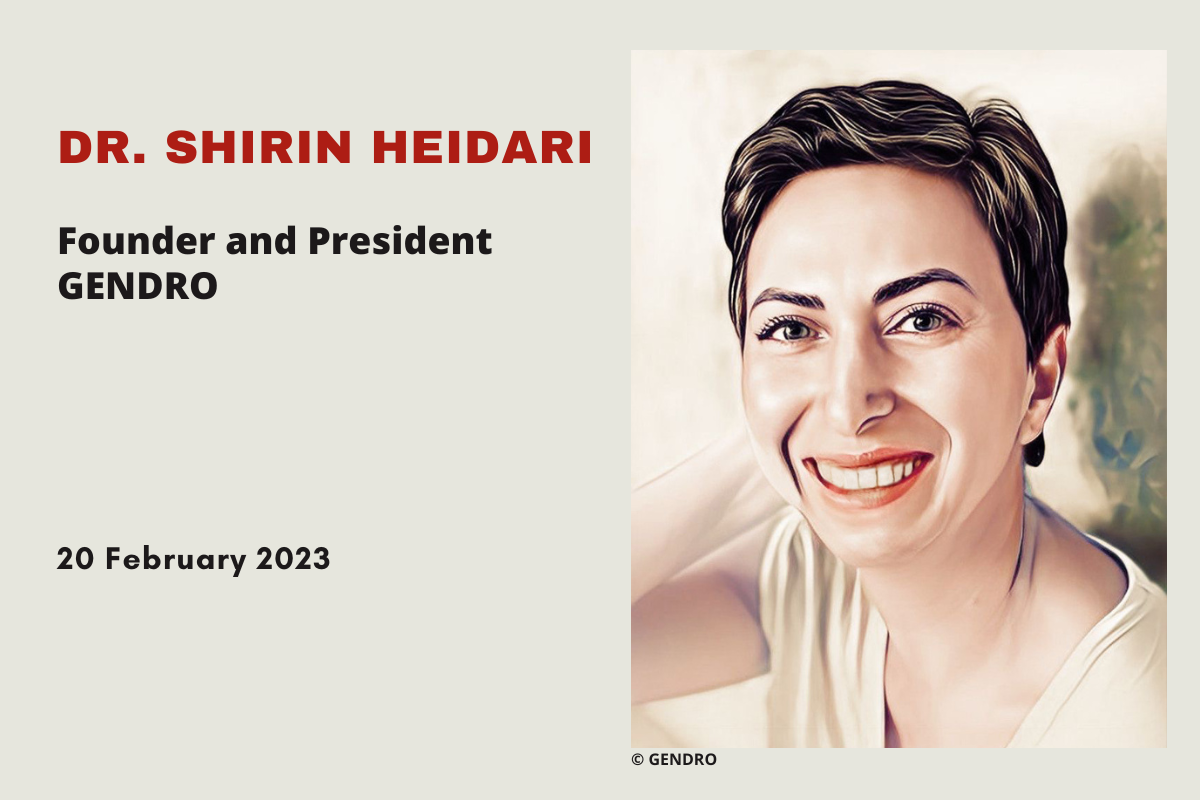The interview | Shirin Heidari
 | How would you present your organization in a few words? What entails your position? What is your goal? |
GENDRO was born from a shared concern about gender bias and the gender gap within research. A gap in research will of course produce fragmented and incomplete knowledge. While it is no surprise that this gap disadvantages women and gender non-conforming people, it is important to highlight that it can also have negative consequences for men.
Our beliefs are simple. We believe that any evidence produced to improve and advance our society, be it through academic research, policy analysis, or programmatic evaluation, must take into account the significant influence of gender and sex. It is impossible to ignore, as the interactions of gender and sex with other dimensions that shape our experiences, such as age, race, ethnicity, ability, migration status, sexual orientation, and gender identity, are enormous and impactful.
Our goals are to work collaboratively with partners, raise awareness, strengthen capacity, generate evidence, and advocate for research and any forms of knowledge production, all in order to create more equitable solutions that account for sex and gender differences.
 | Among the concentration of actors in Geneva (IOs, NGOs, permanent missions, academia, and the private sector), who do you work with and how? |
Naturally, given the breadth of our work, we work with a wide range of partners across all sectors. Firstly, there are academic researchers who we work directly with to generate evidence, build capacity or introduce changes that can have a systemic effect.
NGOs and international organizations are interesting partners as they are often both users and producers of data and research. Therefore, within this relationship, we have a double opportunity to make an impact. Not only do we raise awareness about the persistent gender gaps in NGO research, but we also create collaborative opportunities for them to address these biases within their organizations or in their sector.
Further, we also engage with Member States and permanent missions to draw their attention to the importance of including gender dimensions in their multilateral negotiations. One such example is the work we did advocating for the inclusion and integration of gender dimensions in the pandemic instrument negotiated.
Finally, the private sector, including the pharmaceutical industry and diagnostic companies, are key actors who invest in research and the development. Engaging them to have greater attention to sex and gender in drug or vaccine development or development of diagnostics tools will be a game changer.
As you can see, there is a large spread of partners, but each has an important part to play in our work and the results we want to achieve.
 | What are the strengths and weaknesses of Geneva with regards to the development of your activity? |
Considered the capital of global health and a hub for international organizations, being located in Geneva offers a unique opportunity for our work. We can build strong partnerships with a variety of local actors, including Member States. It means we can easily build collaborative projects and even create a movement that amplifies our efforts with the potential of a greater impact. Given the frequency of events and meetings in Geneva, it also allows the unique opportunity to engage and build partnerships with many actors from other parts of the world who often travel to Geneva.
In terms of weaknesses, one we identified early on was the lack of opportunities and platforms for actors who work on gender equality and gender mainstreaming, particularly in global health, to get together and collaborate. It was quickly apparent that many gender experts and advisors within organisations work in silos, often with limited time and resources. While not ideal, it was interesting that so many were facing the same challenges. This fact was consequently part of the reason we launched GENDRO’s Gender, Health and Evidence network.
Initially, we offered this network as a platform for Geneva-based people engaged in the intersection of gender, evidence, and health to meet in person. However, as a result of COVID-19 and moving to virtual meetings, we’ve been able to grow the network globally, with members joining from different corners of the world. It was, of course, a welcome move, as our intention has always been to have a global impact and engage with partners far outside Geneva. This was also a great opportunity for us to connect and engage with many Swiss actors too, from across Switzerland, and was part of the reason GENDRO was co-founder and co-chair of the Swiss Women’s Health Alliance (SWHA), together with Concept Foundation.
 | What do you think global governance should look like 20 or 30 years from now? |
What I would like to see in the future is a more feminist global governance that is more diverse, inclusive, responsive, participatory, and works towards a just and equitable world. One that levels the playing field for global decision-making and addresses the power imbalances that we see today.
 |
|
I would have liked to be asked, “What keeps you going?” I believe that change is possible. We all have a moral obligation to contribute to driving the change we want to see. Every small step matters! And, together, we can make an impact. Geneva offers a unique and privileged opportunity where we can build strong connections, create movements, and drive change that can have an impact on a global scale. We must leverage this to build a just, equitable, and inclusive world.
